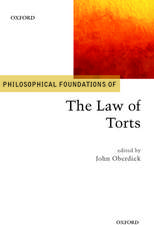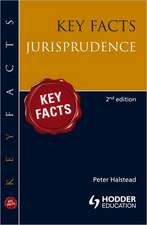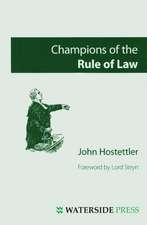Law, Psychology, and Morality: The Role of Loss Aversion
Autor Eyal Zamiren Limba Engleză Hardback – 15 ian 2015
Preț: 631.73 lei
Preț vechi: 903.37 lei
-30% Nou
Puncte Express: 948
Preț estimativ în valută:
120.90€ • 125.75$ • 99.81£
120.90€ • 125.75$ • 99.81£
Carte tipărită la comandă
Livrare economică 03-09 aprilie
Preluare comenzi: 021 569.72.76
Specificații
ISBN-13: 9780199972050
ISBN-10: 0199972052
Pagini: 280
Dimensiuni: 145 x 221 x 48 mm
Greutate: 0.75 kg
Editura: Oxford University Press
Colecția OUP USA
Locul publicării:New York, United States
ISBN-10: 0199972052
Pagini: 280
Dimensiuni: 145 x 221 x 48 mm
Greutate: 0.75 kg
Editura: Oxford University Press
Colecția OUP USA
Locul publicării:New York, United States
Recenzii
Eyal Zamir's book is an astonishing accomplishment of scholarship. It will be an indispensable reference in the discussion of psychology, morality and the law.
An excellent and eye-opening book, packed with insights into law, policy, morality, and psychology. Loss aversion is one of the very few most important findings in the last decades of behavioral science. Zamir has produced the best treatment, by far, of its relevance to law.
If a behavioral trait is real and important, chances are the law knew it all along. But without interdisciplinary expertise, the law lacks a language. Doctrine does not establish the links between seemingly remote phenomena that happen to have a common behavioral cause. In his fascinating, thought provoking book, Eyal Zamir demonstrates how many legal institutions react to, exploit or mold the propensity to evaluate outcomes against a reference point, rather than 'objective' values.
Eyal Zamir masterfully analyzes and explains how the seminal research by Amos Tverksy and Daniel Kahneman on judgment and choice should affect our understanding of the way law has evolved and how legal rules should be rethought. Law, Psychology, and Morality is a must read for anyone who cares about the relationship between how we humans think and act and the type of rules we create to organize our societies.
An excellent and eye-opening book, packed with insights into law, policy, morality, and psychology. Loss aversion is one of the very few most important findings in the last decades of behavioral science. Zamir has produced the best treatment, by far, of its relevance to law.
If a behavioral trait is real and important, chances are the law knew it all along. But without interdisciplinary expertise, the law lacks a language. Doctrine does not establish the links between seemingly remote phenomena that happen to have a common behavioral cause. In his fascinating, thought provoking book, Eyal Zamir demonstrates how many legal institutions react to, exploit or mold the propensity to evaluate outcomes against a reference point, rather than 'objective' values.
Eyal Zamir masterfully analyzes and explains how the seminal research by Amos Tverksy and Daniel Kahneman on judgment and choice should affect our understanding of the way law has evolved and how legal rules should be rethought. Law, Psychology, and Morality is a must read for anyone who cares about the relationship between how we humans think and act and the type of rules we create to organize our societies.
Notă biografică
Eyal Zamir is the Augusto Levi Professor of Commercial Law at the Hebrew University, where he served as Dean of the Faculty of Law from 2002 to 2005. He has been a visiting researcher or visiting professor at the law schools of Harvard, Yale, NYU, Georgetown, UCLA, and Zurich. He holds an LL.B. and Dr.Jur. from the Hebrew University of Jerusalem. Professor Zamir has authored or edited thirteen books and published some fifty articles in Israeli and American law journals, including the Columbia Law Review, the Journal of Legal Studies, California Law Review, Virginia Law Review, and the American Journal of International Law. He is co-author with Barak Medina of: Law, Economics, and Morality (Oxford University Press, 2010).
















